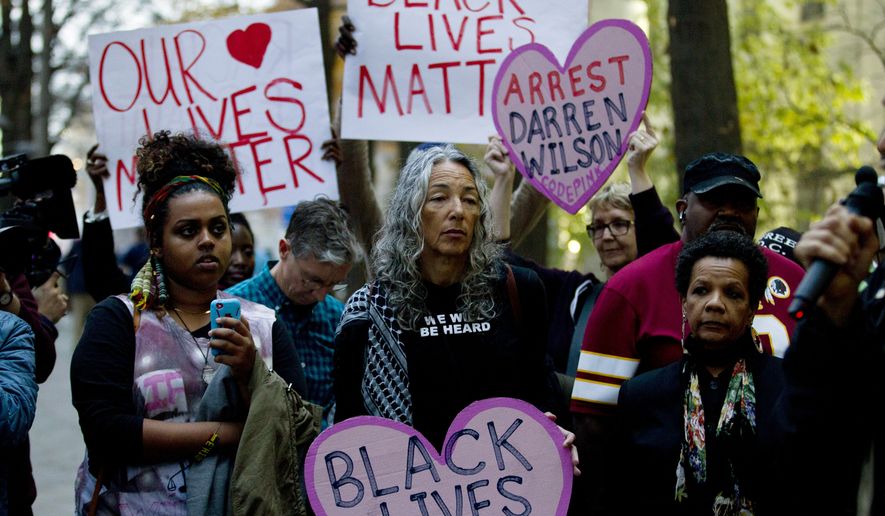Scattered protests shut down traffic around the District for a third day Monday, with demonstrators lying in roadways and blocking highways to protest the grand jury decision in the police shooting death of Michael Brown.
The restraint shown by D.C. police has been a far cry from the way protests were dealt with in years past, when critics say the department acted in a confrontational or subversive manner. Demonstrators have been given wide latitude to march, stop and block vehicles on major roadways in their demonstrations.
Police have been overseeing the protests — part of a national movement expressing frustration with the decision last week not to indict the white police officer, Darren Wilson, in the fatal shooting of the black teenager in Ferguson, Missouri — and issuing warnings to disperse. In most cases, demonstrators have moved on and the protests have stayed peaceful.
Mara Verheyden-Hilliard, executive director for the Partnership for Civil Justice Fund who has been monitoring the demonstrations, said she has not seen any “major noncompliance” on the part of police.
“Demonstrators have been able to be out, to fight for what they believe in and be out in the streets,” she said.
She said the protesters have drawn largely sympathetic responses, even from those in the traffic tie-ups generated by the demonstrations.
“People have been extremely supportive,” she said.
A handful of protesters began the day at about 8:20 a.m. joining hands to block traffic on lower 14th Street in Northwest, snarling inbound traffic from Virginia on the 14th Street Bridge. Demonstrators, carrying signs that read “Black lives matter” and “Hands up, police down” stayed about 20 minutes and provided a major disruption to the morning commute.
Throughout the day, similar actions followed. Traffic was halted from 9:30 a.m. to 9:45 a.m. at Seventh and H streets in the Chinatown neighborhood of Northwest. Police closed Constitution Avenue in Northwest between Ninth and 12th streets briefly around 9 a.m. when protesters gathered there.
On Sunday, demonstrators briefly brought traffic to a halt in both directions of the Southeast-Southwest Freeway on Interstate 395.
On Saturday, hundreds of people blocked a major intersection in the crowded retail area of Wisconsin Avenue and M Street in Georgetown.
A series of rallies across the city, including one Monday at the Justice Department, have drawn large crowds. People in Chicago, New York, San Francisco and other cities walked off their jobs or out of their classrooms Monday in solidarity with demonstrators in Ferguson.
Ms. Verheyden-Hilliard noted the difference between the Ferguson-related protests and some demonstrations in the last 10 years in which Metropolitan Police officers were more confrontational. She attributed the recent tolerance to safeguards put into place after years of lawsuits, including some brought by her organization, and to legislation to protect the rights of protesters.
Police gave demonstrators with the Occupy D.C. movement wide latitude to gather in McPherson Square and Freedom Plaza from October 2011 to February 2012, and evicted them only after the National Park Service gave notice that it would enforce no-camping statutes. The demonstration was allowed to continue months longer than similar Occupy protests in cities such as Philadelphia and Oakland, where protesters were removed.
The response was a far cry from the handling of direct-action protests in the early 2000s, usually tied to meetings of the World Bank and the International Monetary Fund.
At one such protest in April 2000, D.C. police used tear gas after scuffling with demonstrators, some of whom hurled rocks and bottles. An hourslong standoff ended when officials allowed hundreds of demonstrators to symbolically cross their lines and be arrested.
City officials had said they wouldn’t be overwhelmed like Seattle police, who a year earlier imposed a curfew and broke up protests with clubs, rubber bullets and tear gas when similar anti-globalization protests turned into riots.
The response at the time earned the District a national reputation for its successful handling of the demonstrations.
But at George W. Bush’s presidential inauguration a year later, activists said, authorities detained hundreds of protesters before they reached the parade route. The city settled a lawsuit on the matter in 2006.
Even the response to that event was eclipsed by the demonstrations at the March 2002 World Bank/IMF meetings, in which several hundred protesters, some of whom vowed to “shut down the city,” were arrested along with a handful of journalists and passers-by in Northwest’s Pershing Park. The arrests became the subject of lawsuits that the District paid millions of dollars to settle.
Days before the mass arrests, Police Chief Charles H. Ramsey was criticized for suggesting that commuters bring “a sandwich and a good CD to listen to because you could be stuck in traffic for a while.”
• Matthew Cella can be reached at mcella@washingtontimes.com.




Please read our comment policy before commenting.